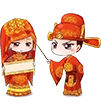春节的古诗英文怎么写-关于春节的古诗用英语怎么写
- 心醉
- qiazhi
- 2024-02-01 17:00:01
1 春节的古诗英文怎么写
Chinese New Year, also known as the Spring Festival, is the most important traditional holiday in China,It is a time for family reunions, feasts, and celebrations,As a country with a rich cultural heritage, China has a long history of poetry, and many ancient poets have composed beautiful verses about the Spring Festival,In this article, I will introduce some of these classical Chinese poems and provide their English translations.
1,元日- "New Year's Day" by Wang Anshi
春心尽,春酒醒,春色好,春意长。
乍暖还寒时候晚,一年之计在于春。
世上如今无少年,时光匆匆看不见。
愿此一年归去年,恢复少年时的面。
When winter ends and spring arrives, the heart feels joy and the wine wakes up,
The spring scenery is beautiful, and the spring feelings are long.
At this time of lingering coldness in the midst of warmth, the whole year's plan depends on spring,
In this world, young people are hard to find nowadays, and time passes by in a hurry,
I wish to make this year as the last, to restore the face of my youth.
2,古朗月行- "A Moonlit Night" by Zhang Jiuling
小时不识月,呼作白玉盘。
大罐盛清光,中有青蛾端。
朝游北邙山,夕照南河岸。
愿君多采撷,此物相顾。
When I was young, I didn't know what the moon was, and I called it a white jade plate.
A large pot holds the bright moonlight, with a green moth resting on it.
In the morning, I visit the Beimang Mountain, and in the evening, I admire the sunset on the South Riverbank.
I hope you can collect more of this beauty, as it is the most mutual admiration.
3,登舟望秋月- "Boarding the Boat and Gazing at the Autumn Moon" by Zhang Ruoxu
月上柳梢头,人约黄昏后。
今年看又过,明年秋更佳。
知君此别意,为我河山阻。
长忆观潮处,海日生残酒。
The moon is hanging above the willow branches, and people gather after dusk.
This year's moon viewing has passed, and next year's autumn will be even better.
I know your intention to part, hindered by the rivers and mountains for my sake.
I will always remember the place where we watched the tides, with the sea producing residual wine.
These classic Chinese poems capture the essence of the Spring Festival, evoking feelings of joy, longing, and nostalgia,While the beauty of these verses can be appreciated in their original language, translating them into English helps to share the cultural significance of this important holiday with a wider audience.
The Spring Festival is not only a time for poetry, but also a time for family, food, and festivities,Chinese families come together to celebrate and pay respects to their ancestors,Traditional customs and activities include cleaning the house to remove bad luck, setting off firecrackers to scare away evil spirits, and giving red envelopes with money to bring good fortune.
In conclusion, the Spring Festival is an integral part of Chinese culture, and these classical poems serve as a testament to the deep meaning and significance of this holiday,They remind us of the importance of family, tradition, and the passing of time,As we celebrate the Spring Festival, let us appreciate the richness of Chinese poetry and the traditions that make this holiday so special.

2 关于春节的古诗用英语怎么写
The Spring Festival, also known as Chinese New Year, is the most important traditional festival in China,It is a time for family reunions, food feasts, and colorful celebrations,As an integral part of Chinese culture, the Spring Festival is often celebrated through the recitation and appreciation of ancient poems,In this article, we will explore some classic Chinese poems about the Spring Festival and attempt to translate them into English.
1,Poem: "春节晓行" (Morning Walk During the Spring Festival)
Author: 王湾 (Wang Wan)
Translation:
In a peaceful city, the morning sun rises,
Festive red lanterns embellish the streets.
The sound of firecrackers creates a joyous atmosphere,
Greetings and blessings fill the air.
Explanation:
This poem depicts the scene of a morning walk during the Spring Festival,Red lanterns, symbolizing prosperity and good luck, can be seen in the streets,The sound of firecrackers signifies a festive atmosphere, while people exchange greetings and good wishes.
2,Poem: "春望" (Spring View)
Author: 杜甫 (Du Fu)
Translation:
The night is gradually turning into day,
Spring arrives silently, enveloping the land.
Peach blossoms and willows blend their colors,
Nature awakens with its vibrant array.
Explanation:
"春望" expresses the poet's anticipation of the spring season,The verses describe the quiet arrival of spring, as nature begins to awaken after the long winter,The blooming peach blossoms and vibrant willows symbolize the beauty and vitality of the new season.
3,Poem: "乡村四月" (April in the Countryside)
Author: 罗梅诗 (Luo Meicen)
Translation:
April comes to the countryside, embracing the Spring Festival,
Sparrows chirp and butterflies dance in the air.
The aroma of flowers fills the tranquil village,
Joyous laughter accompanies the farmers' labor.
Explanation:
This poem portrays the idyllic scene of an April countryside during the Spring Festival,Birds singing and butterflies dancing in the fresh spring air signify the arrival of the festive season,The fragrance of flowers permeates the village, adding to the joyous atmosphere as farmers work in their fields.
These translated poems offer a glimpse into the spirit and atmosphere of the Spring Festival in China,Through the concise and beautiful expressions of these ancient poets, we gain insight into the cultural significance of this important holiday,Reciting or appreciating these poems during the Spring Festival serves as a way to connect with Chinese tradition and celebrate the beginning of a new year.
In addition to the poems mentioned above, there are many other ancient Chinese poems that highlight various aspects of the Spring Festival, such as family reunions, traditional foods, dragon dances, and the exchange of red envelopes,These poems, passed down through generations, are cherished as treasures of Chinese culture, offering wisdom, emotion, and reflections on life.
In conclusion, the Spring Festival is a deeply cherished and celebrated holiday in China,By translating these ancient Chinese poems about the Spring Festival into English, we hope to share the essence of this traditional festival with a wider audience, promoting cultural understanding and appreciation.








